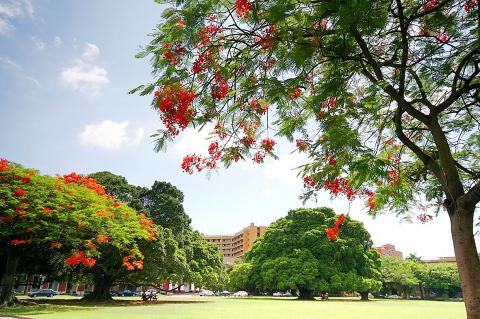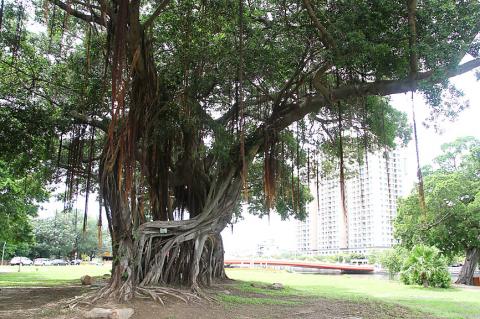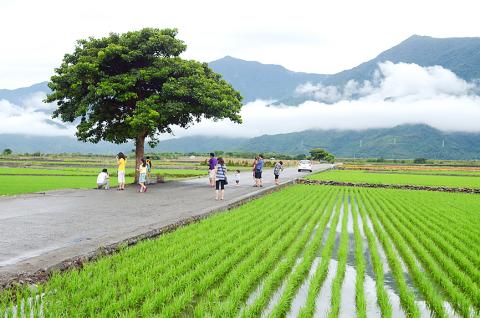While there are plenty of old banyan trees in Taiwan, none can be said to enjoy quite the same level of fame as a centennial banyan that grows at Greater Tainan’s Cheng Kung University and was the inspiration for Cathay Life Insurance Co’s tree-shaped logo.
Visitors stepping onto the university’s Guangfu campus are met with the sight of an idyllic meadow to their right, in the middle of which towers the imposing mushroom-shaped banyan. The 100-year-old tree is so massive that it dwarfs all the other banyans on campus.
It is said that the real-life Cathay Life banyan was planted by Japanese Emperor Showa in 1923 and that it is indigenous to Japan’s Kagoshima Prefecture.

Photo taken from Cheng Kung University’s Facebook page
Even so, the giant tree is not that special in the eyes of many locals, who are accustomed to the centennial banyans — a type of fig tree — ubiquitous across parks in Greater Tainan, standing out only for its sheer size.
As any celebrity knows, the road to fame often presents itself when one least expects it and so it was with the Guangfu banyan.
In 1995, Cathay Life donated NT$1 million (US$33,333) to adopt the tree and designed its trademark logo based on the tree’s mushroom-like silhouette.

Photo: CNA
Alongside the slogan: “Bury your roots deep to reach high,” the titanic banyan began appearing in print advertisements and TV commercials for the insurer nationwide, earning it overnight fame.
As a result of this publicity, tourists have swarmed to the university to marvel at the tree for the past 20 years, while the school’s administration often allows its banyan grove to be used a venue for events.
Cathay Life’s banyan has also became a landmark of Greater Tainan and a popular spot in which to play basketball, have a date or engage in a myriad of other leisure activities.

Photo: CNA
The banyan is not Taiwan’s only “celebrity” tree: A red cedar that grows at the end of Taitung County’s Brown Avenue also rose to fame, gaining nationwide recognition after Taiwanese-Japanese actor Takeshi Kaneshiro (金城武) was filmed having tea underneath it in a globally televised EVA Airways commercial earlier this year.
The cedar has since been dubbed the “Takeshi Kaneshiro Tree.”
The commercial, shot in Chihshang Township (池上), featured the superstar serving tea and cooling off under the shade of the red cedar. The ad became an overnight sensation as its depiction of leaving the busy city life behind to be immersed in nature resonated with many.
Wu Hsiu-lan (吳秀蘭), who owns the red cedar, said her father planted the tree 40 years ago so he and his buffalo could cool off in its shade.
The cedar’s popularity even prompted the Chihshang Township Office to list it as a cultural site and control traffic on the avenue running alongside it — an unprecedented move given that the avenue is listed as an agricultural road.
The tree, which has the potential of generating annual profits of up to NT$700 million, sparked a wave of panic when it was uprooted by Typhoon Matmo late last month.
Fortunately, thanks to the special attention it received from horticulturalists, it has been restored to an upright position.
Another famous banyan rivaling the Cheng Kung University landmark is the “lovey-dovey tree” that sits by the Greater Tainan canal.
The tree found instant fame after it was featured in several scenes of last year’s Taiwanese blockbuster Zone Pro Site (總舖師).
In one of the scenes, the film’s protagonists, A-hai (阿海) and Hsiaowan (小婉), a young couple, sit on top of the banyan’s roots, transforming it into a popular date spot overnight. Couples from across Taiwan now come to Greater Tainan to take pictures sitting on the tree’s roots.
Greater Tainan Tourism Bureau Director Chen Chun-an (陳俊安) said that despite the film star tree’s high profile, the city government chose not to further publicize it or establish any infrastructure in its surroundings because it wants to preserve the banyan so it continues to be the same healthy, imposing tree seen in the movie.
Stressing the importance of conservation, Chen urged visitors to bear in mind that the “lovey-dovey tree” may not be fit for climbing due to its age, suggesting that they just photograph it from a distance.

WANG RELEASED: A police investigation showed that an organized crime group allegedly taught their clients how to pretend to be sick during medical exams Actor Darren Wang (王大陸) and 11 others were released on bail yesterday, after being questioned for allegedly dodging compulsory military service or forging documents to help others avoid serving. Wang, 33, was catapulted into stardom for his role in the coming-of-age film Our Times (我的少女時代). Lately, he has been focusing on developing his entertainment career in China. The New Taipei District Prosecutors’ Office last month began investigating an organized crime group that is allegedly helping men dodge compulsory military service using falsified documents. Police in New Taipei City Yonghe Precinct at the end of last month arrested the main suspect,

Eleven people, including actor Darren Wang (王大陸), were taken into custody today for questioning regarding the evasion of compulsory military service and document forgery, the New Taipei District Prosecutors’ Office said. Eight of the people, including Wang, are suspected of evading military service, while three are suspected of forging medical documents to assist them, the report said. They are all being questioned by police and would later be transferred to the prosecutors’ office for further investigation. Three men surnamed Lee (李), Chang (張) and Lin (林) are suspected of improperly assisting conscripts in changing their military classification from “stand-by

LITTORAL REGIMENTS: The US Marine Corps is transitioning to an ‘island hopping’ strategy to counterattack Beijing’s area denial strategy The US Marine Corps (USMC) has introduced new anti-drone systems to bolster air defense in the Pacific island chain amid growing Chinese military influence in the region, The Telegraph reported on Sunday. The new Marine Air Defense Integrated System (MADIS) Mk 1 is being developed to counter “the growing menace of unmanned aerial systems,” it cited the Marine Corps as saying. China has constructed a powerful defense mechanism in the Pacific Ocean west of the first island chain by deploying weapons such as rockets, submarines and anti-ship missiles — which is part of its anti-access/area denial (A2/AD) strategy against adversaries — the

Former Taiwan People’s Party chairman Ko Wen-je (柯文哲) may apply to visit home following the death of his father this morning, the Taipei Detention Center said. Ko’s father, Ko Cheng-fa (柯承發), passed away at 8:40am today at the Hsinchu branch of National Taiwan University Hospital. He was 94 years old. The center said Ko Wen-je was welcome to apply, but declined to say whether it had already received an application. The center also provides psychological counseling to people in detention as needed, it added, also declining to comment on Ko Wen-je’s mental state. Ko Wen-je is being held in detention as he awaits trial